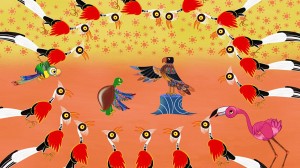“At weddings in our family and I know in most Nigerian weddings we throw large amounts of money at everyone it’s not even the married couple, literally everyone gets money thrown at them. We typically all stand in a circle and the elder members of the family will sometimes throw thousands of dollars each in the middle with bills ranging from singles to ten’s. My family calls it the money dance but I know some call it money spraying. This is pretty much to symbolize a showering of happiness and good fortune in their future lives together. It also shows how much the group cares for each other.”
Context:
Money throwing is pretty common at Nigerian weddings. My informant learned this from going to weddings in his family as a kid and young adult. My informant was born in Philadelphia but his parents moved from Nigeria with other family members and brought many of the customs with them, including this one. He said it his favorite part of going because who doesn’t love traditions that involve free money.
Analysis:
Hearing this made me really want to implement this tradition in all weddings. It is a super cool Nigerian tradition that I had never heard being practiced in any other culture. I find it fascinating that so many different countries and cultures have very unique traditions when it comes to a wedding.


